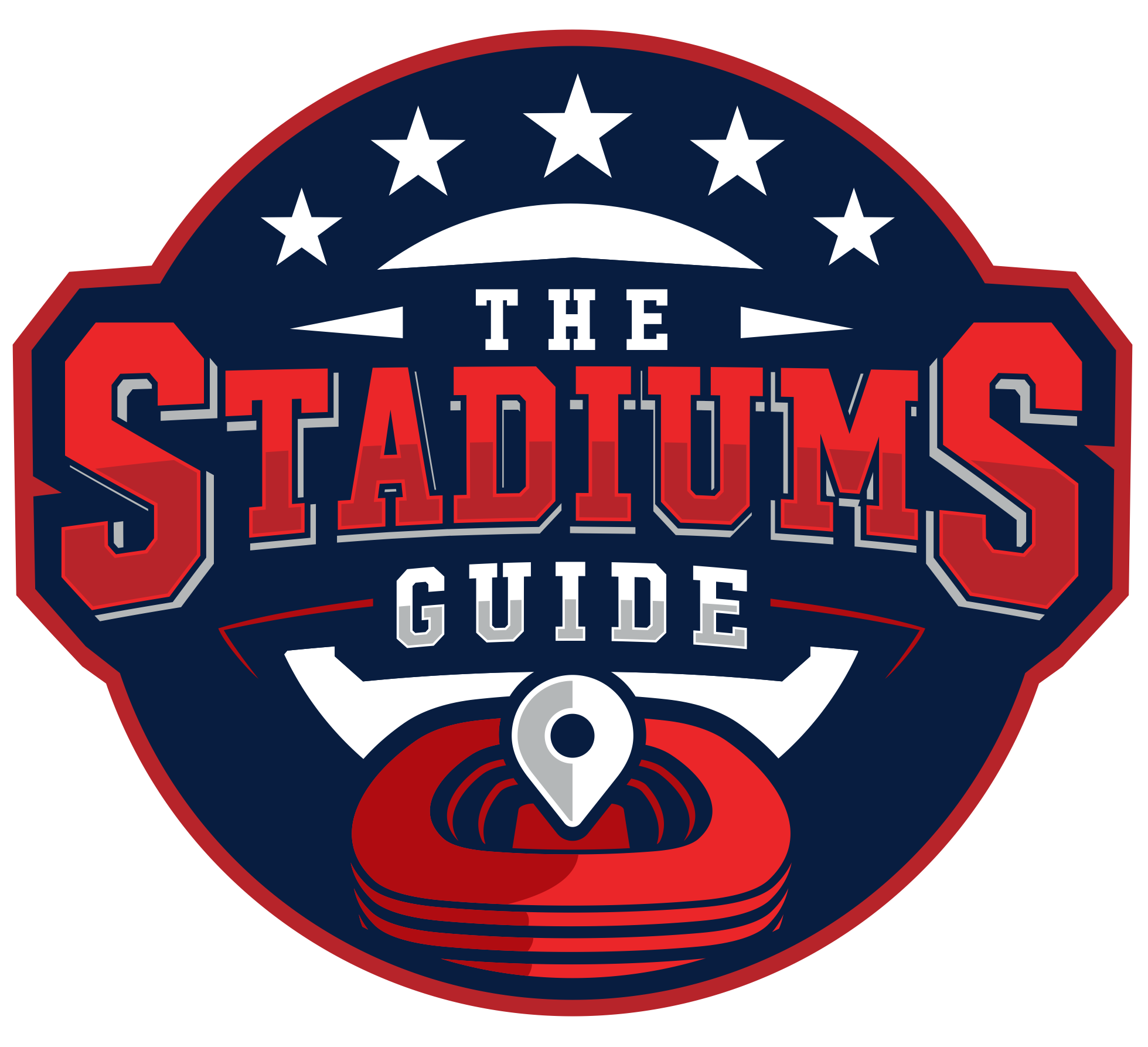Located in Sinsheim, Baden-Württemberg, Germany, PreZero Arena stands as a distinctive, modern, and multi-purpose stadium. Known previously as Rhein-Neckar-Arena and Wirsol Rhein-Neckar-Arena, this incredible venue opened in 2009 and primarily serves as the home ground for the TSG 1899 Hoffenheim football club. With a capacity of over 30,000 spectators, it has become an emblem of the team’s identity and success in German football.
The design of the PreZero Arena highlights state-of-the-art features that enhance the overall fan experience. From April to November, stadium tours are available for fans to immerse themselves in the fascinating atmosphere of TSG 1899 Hoffenheim’s home. This architectural marvel represents the growth and ambition of the club, as it is a significant upgrade from their previous ground, Dietmar-Hopp-Stadion.
In 2019, the stadium adopted the current name, PreZero Arena, to mark the beginning of a strategic partnership between TSG Hoffenheim and PreZero. This collaboration, commencing in the second half of the season, showcased the club’s dedication to progressive endeavors in football and environmental sustainability.
History of PreZero Arena
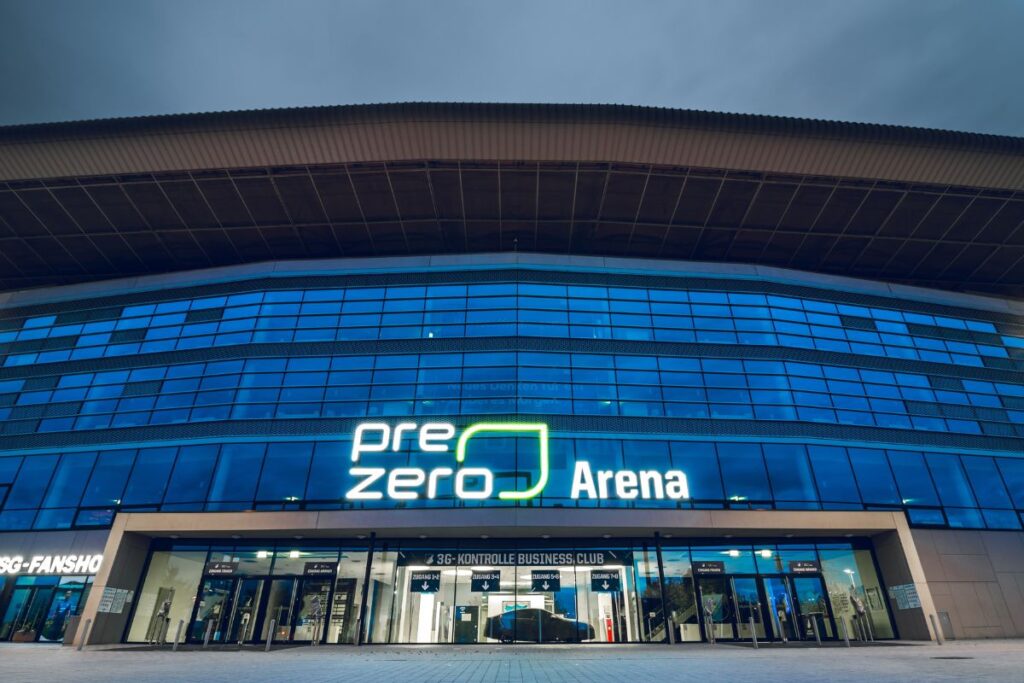
The PreZero Arena, primarily known as Rhein-Neckar-Arena, is a multi-purpose stadium situated in Sinsheim, Baden-Württemberg, Germany. It is the home ground of TSG 1899 Hoffenheim, hosting their home football matches. The stadium has a seating capacity of 30,150, with 9,150 standing spaces.
Construction of the PreZero Arena began in May 2007 and concluded in January 2009. This modern stadium was built to replace Hoffenheim’s former ground, the Dietmar-Hopp-Stadion, which lacked the facilities required for Bundesliga football. Upon its completion, an opening ceremony and a friendly match took place between the home team and a selection of players from the Rhine-Neckar region.
The PreZero Arena is not only known for its football matches but also stands out for its sustainability efforts. It has been certified as the first zero-waste stadium in the Bundesliga. This certification demonstrates the club’s commitment to environmental responsibility and maintaining an eco-friendly stadium environment.
In terms of location, the PreZero Arena is within proximity to the Technik Museum Sinsheim, making it easily accessible for football fans and museum visitors alike.
TSG Hoffenheim: PreZero Arena’s Resident Club

Club Origins and Early Years
TSG Hoffenheim is a professional football club based in Sinsheim, Germany. Founded in 1899 as a gymnastics club, the football department was established in 1921. Initially, the club played in the lower leagues of German football, facing a constant struggle to rise through the ranks. Throughout the years, the club grew and began to achieve success at the regional level.
Recent Successes
In the 2000s, TSG Hoffenheim experienced a rapid ascent through the German football pyramid, reaching the Bundesliga in 2008. One of the significant factors contributing to the club’s growth is the support of software billionaire Dietmar Hopp. Under his patronage, TSG Hoffenheim developed a strong youth academy and invested in team management. Since their promotion to the Bundesliga, the club has become a competitive force in German football, regularly participating in European competitions such as the UEFA Champions League and the UEFA Europa League.
Key Players
Throughout TSG Hoffenheim’s history, several key players have contributed to the club’s success on the field. Some notable names include:
- Vedad Ibisevic: A former Bosnian international striker, Ibisevic was instrumental in Hoffenheim’s promotion to the Bundesliga, scoring 18 goals in their debut season.
- Roberto Firmino: The Brazilian forward joined Hoffenheim in 2011 and continued to develop as a star player for the club before moving to Liverpool in 2015.
- Niklas Süle: A product of TSG Hoffenheim’s youth academy, Süle emerged as one of the top young defenders in Germany, transferring to Bayern Munich in 2017.
As the resident club of PreZero Arena, TSG Hoffenheim continues to compete in the Bundesliga, striving for further success while promoting sustainability in football through their pioneering zero-waste stadium.
Architecture and Design of PreZero Arena
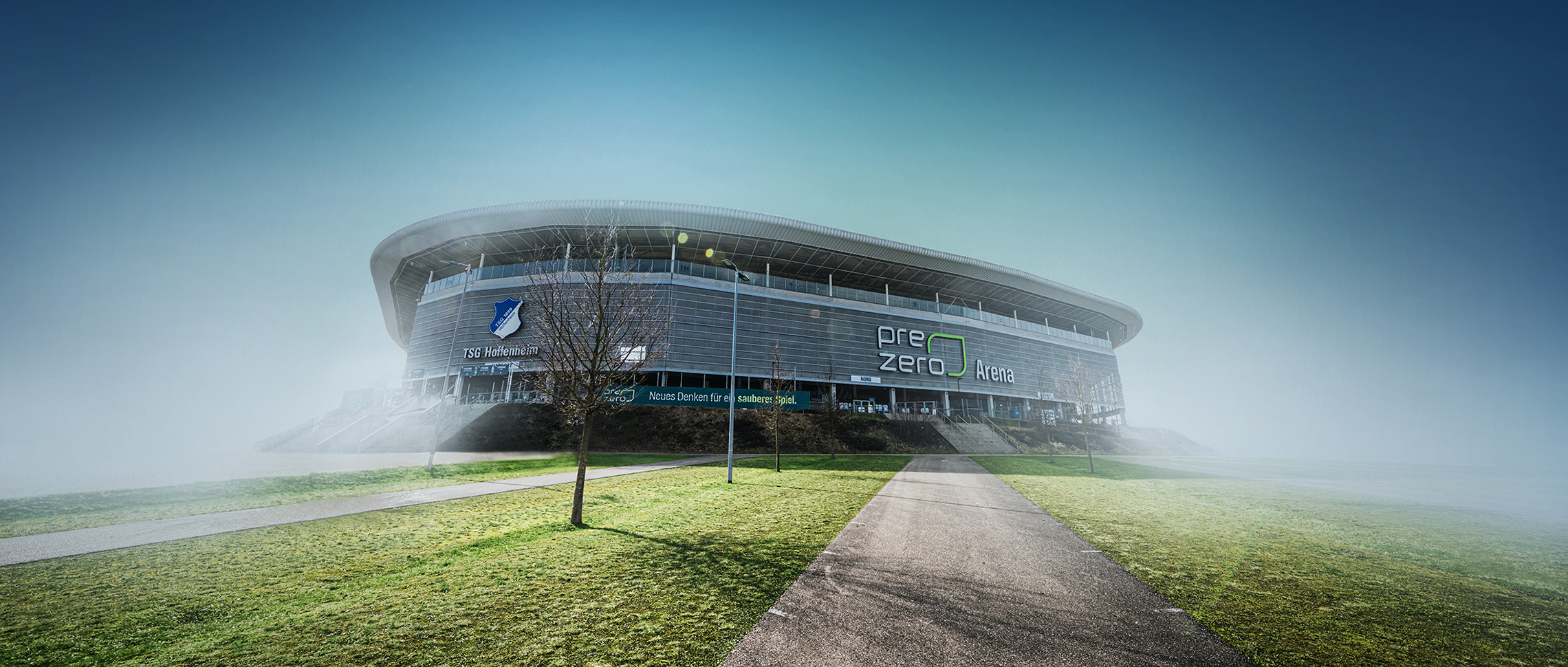
The PreZero Arena, also known as the Rhein-Neckar-Arena, is located in Sinsheim, Germany and serves as the home stadium for the TSG 1899 Hoffenheim football club. The stadium was constructed between May 2007 and January 2009, replacing their old Dietmar-Hopp-Stadion that lacked the necessary facilities for Bundesliga football.
Designed to accommodate 30,150 spectators, the stadium has an impressive architectural layout that includes 9,150 standing spaces for fans. The modern design not only reflects the club’s ambition but also emphasizes sustainability. It has successfully managed to become the first European stadium to receive a TÜV certification as a zero-waste facility.
The arena’s structure features well-crafted details, providing spectators with excellent sightlines, comfortable seating, and atmospheric lighting. There is also convenient access to various amenities, such as restrooms, concession stands, and merchandise shops, ensuring an enjoyable matchday experience for fans.
From a transportation standpoint, the PreZero Arena is highly accessible. With the Sinsheim-Museum/Arena S-Bahn stop just over a kilometer away and shuttle buses running between the stadium and Sinsheim main station, getting to the stadium is made easy. Additionally, the arena can be reached by car via the newly built Sinsheim-Süd junction on the federal motorway 6.
In summary, the PreZero Arena boasts a modern and sustainable architectural design that caters to TSG 1899 Hoffenheim fans and visitors alike. With comfortable amenities and easy access, it exemplifies a top-tier stadium and sets a high standard for future sports venues around the world.
Location & Accessibility
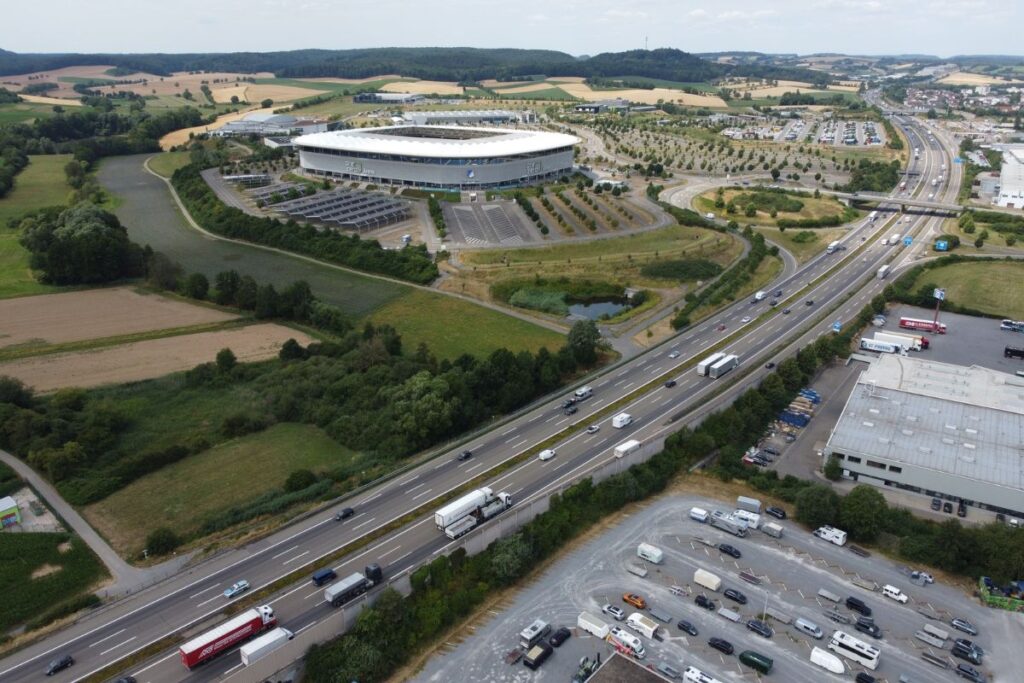
The PreZero Arena, situated in Sinsheim, Baden-Württemberg, Germany, is home to TSG Hoffenheim. Conveniently located approximately 6 kilometers away from Hoffenheim and just over 2 kilometers from Sinsheim’s historic town center, the arena is easily accessible for football fans. The stadium is also close to the town’s main railway station, with the walk taking less than 30 minutes.
Deutsche Bahn, the German rail service, offers relief trains for TSG Hoffenheim’s home Bundesliga fixtures, making it easier for fans to attend games without much hassle. The PreZero Arena, formerly known as Rhein-Neckar-Arena and Wirsol Rhein-Neckar-Arena, is a multipurpose stadium mainly used for football matches.
With a total seating capacity of 30,000 spectators, the stadium has been designed with fan experience in mind. The lack of supporting pillars ensures that there are unobstructed views from all seats in the arena. Additionally, the arena covers an area of 40,000m² and has a total weight of 3,400 tonnes.
In summary, the PreZero Arena is an accessible and well-designed stadium, perfectly suited for TSG Hoffenheim’s home games. With easy transportation options and excellent facilities, the arena stands out as a top-notch destination for football enthusiasts.
Facilities Presented at PreZero Arena
Seating Capacity
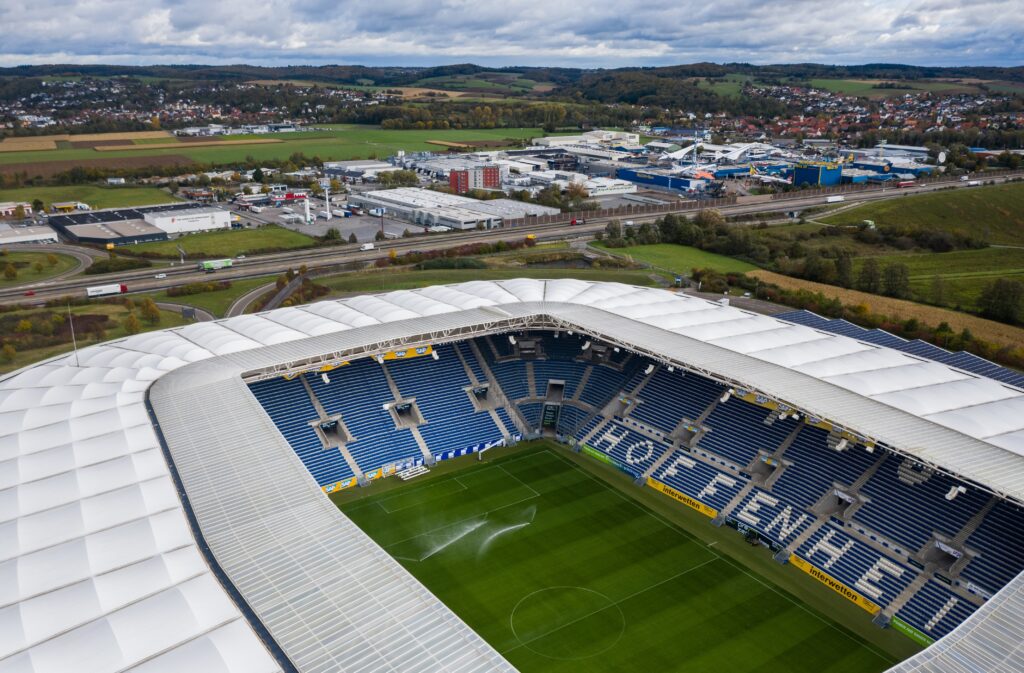
PreZero Arena, previously known as Rhein-Neckar-Arena and Wirsol Rhein-Neckar-Arena, is a multipurpose stadium located in Sinsheim, Baden-Württemberg, Germany. It is primarily used for football matches and hosts the home games of 1899 Hoffenheim. The stadium has a seating capacity of 30,000 for fans to comfortably enjoy the games.
Training Grounds
In addition to the main pitch, which measures 105m x 68m, the arena offers excellent training grounds for the team. These extensive facilities provide a conducive environment for the players to practice and improve their skills.
Catering Outlets
At PreZero Arena, spectators can enjoy a variety of refreshments and snacks during the games. The stadium is equipped with catering outlets to cater to the culinary needs of the fans, ensuring that no one leaves the game hungry. As the first European ground to be TÜV-certified as a zero-waste stadium, PreZero Arena is committed to the environment, undertaking climate protection activities within these catering outlets as well.
Sustainability Efforts

The PreZero Arena, home of TSG Hoffenheim, has made significant strides in its commitment to sustainability. Through a partnership with PreZero, the stadium aims to become the first certified zero-waste stadium in the Bundesliga by minimizing non-recyclable waste and protecting the climate.
The transition to a returnable cup system is a notable milestone in these efforts. If all seats are sold out per match, approximately 22,000 cups (0.5 l), 2,500 coffee cups, and 5,000 mulled wine cups are required at the bar, making this initiative particularly impressive.
In March 2022, TSG Hoffenheim and PreZero conducted extensive analyses to determine the feasibility of transforming the PreZero Arena into a zero-waste facility. By involving experts from sports, business, research, and politics, the collaboration has proven its dedication to achieving certified sustainability.
As of May 4, 2023, the PreZero Arena has become the first certified zero-waste stadium in the Bundesliga. This achievement sets a benchmark for other stadiums to follow, demonstrating the importance of prioritizing environmental responsibility in the world of sports.
Famous Events at PreZero Arena
PreZero Arena, formerly known as Rhein-Neckar-Arena, is the home stadium of TSG 1899 Hoffenheim. Since its opening in 2009, the arena has facilitated several memorable events and important matches.
The opening ceremony of PreZero Arena was held in January 2009, featuring a friendly match between TSG 1899 Hoffenheim and a selection of players from the Rhine-Neckar region. This event marked the beginning of a new era for the German football club as it transitioned from a smaller stadium to a state-of-the-art multi-purpose venue.
Over the years, PreZero Arena has hosted several high-profile Bundesliga matches, most notably the fixture between TSG Hoffenheim and German football giant, FC Bayern Munich. These competitive matches often draw large crowds and contribute to the stadium’s lively atmosphere.
Apart from Bundesliga matches, PreZero Arena has also been a venue for international football. The arena has been used for matches in various levels of international competition, such as the European Under-19 Football Championship and UEFA Europa League fixtures.
In addition to football, PreZero Arena has also been utilized for non-sporting events. Concerts by popular artists and bands have taken place at the arena, providing locals and tourists with an entertainment hotspot in the Sinsheim region.
PreZero Arena continues to be a versatile and significant venue for TSG Hoffenheim, leaving fans eagerly awaiting upcoming events and future milestones in the arena’s history.
How to Get Involved

TSG Hoffenheim is a renowned German football club that plays at the PreZero Arena, a stadium with a capacity of 30,150 spectators. Besides enjoying football matches, there are several ways for fans and visitors to engage with the club and its activities.
Stadium Tours: Hoffenheim offers guided stadium tours around the PreZero Arena, providing a unique opportunity to explore the venue up close. These tours typically last for 60 minutes and are usually held on Saturdays during the summer months or on Saturdays when the club plays away from home.
Sustainability Initiatives: As part of a strategic partnership, PreZero and TSG Hoffenheim collaborate on sustainability projects, aiming to make PreZero Arena the first ‘Zero Waste Stadium’ in the Bundesliga. Fans can stay informed about these initiatives and participate in events to promote environmentally friendly practices.
eSports Partnership: PreZero is not only linked to TSG Hoffenheim through stadium naming rights but also serves as the official sustainability partner for TSG’s eSports department. ESports enthusiasts can follow the team’s activities and show their support through various channels.
To actively engage with TSG Hoffenheim and the PreZero Arena, fans are encouraged to visit the club’s official website and follow their social media channels for updates on upcoming events, initiatives, and ways to get involved.
